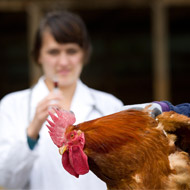Campylobacter vaccine development hits stumbling block

Around 80 per cent of campylobacter cases in the UK stem from contaminated poultry.
The immune response of farmed chickens does not develop quick enough to fight off campylobacter during their short lifespan, according to the University of Liverpool.
The findings have important implications towards developing a poultry vaccine for the bacterium, which is responsible for hundreds of thousands of food poisoning cases each year.
Finding a way to control campylobacter infection is a priority for the poultry industry. But there are no commercial vaccines available, and their development is held back by poor understanding.
Writing in the journal Scientific Reports, researchers show that antibody production plays a role in the clearance of intestinal infections. But the antibody fails to eliminate the bacterium within the lifetime of a commercial broiler chicken, which is about six weeks.
“Our findings suggest that any Campylobacter vaccine relying solely on an antibody response is unlikely to be effective in broiler chickens,” explained Professor Paul Wigley, from the University’s Institute of Infection and Global Health.
“It’s likely to be very challenging to produce a protective immune response in broiler chickens before slaughter age, which is around six weeks of age.
“Vaccines that focus on a cell-mediated immune response, or alternatively some way of speeding up the production of antibodies in broiler chickens, may offer more promising routes to controlling Campylobacter, and ultimately reducing the amount of contaminated chicken in our supermarkets.”
Around 80 per cent of campylobacter cases in the UK stem from contaminated poultry.
While good hygiene and cooking practices prevent infection, there are still more than 280,00 cases in the UK, costing the economy an estimated £900 million each year.



 RCVS Knowledge has welcomed Professor Peter Cockcroft as editor-in-chief for Veterinary Evidence.
RCVS Knowledge has welcomed Professor Peter Cockcroft as editor-in-chief for Veterinary Evidence.